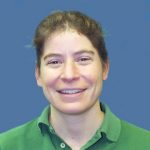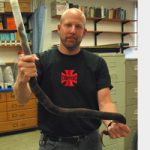Not surprisingly, many research groups in EEB study evolution in one form or another. Some are systematists studying patterns of biodiversity and processes that create it, others are population geneticists, phylogeneticists, parasitologists, paleobiologists, and evolutionary ecologists.
| Photo | Name | About |
|---|---|---|
 | James Bernot | The Bernot Lab studies the crustacean genomics and phylogeny, evolution of parasitism, and parasitic copepod evolution, host-associations, systematics, taxonomy, and morphology. |
 | Daniel Bolnick | The Bolnick Lab studies the evolution and ecology of variation within species, evolutionary immunology, host-parasite co-evolution, and speciation. I combine observational natural history with experiments, theory, and genomics. |
 | Andrew Bush | The Bush Lab studies paleobiology, including Phanerozoic trends in ecospace utilization and biodiversity, employs gradient analyses of patchy paleoecologic distributions, and focuses on the stratigraphy and extinction in the Late Devonian of the Appalachian Basin. |
 | Andrius Dagilis | The Dagilis Lab studies the genetics of speciation, the evolution of genome organization, and broad patterns of speciation and introgression across groups. |
 | Pamela Diggle | The Diggle lab studies the effects of genotype, environment, and ontogenetic history on the development and evolutionary diversification of plant phenotypes. |
 | Carlos Garcia-Robledo | The Garcia-Robledo lab studies the evolutionary ecology of plant-insect interactions, adaptation to novel environments (e.g., novel hosts, climate change), molecular biology, insect physiology, and demography. |
 | Bernard Goffinet | The Goffinet Lab studies bryophytes and lichenized fungi, the evolution of spore dispersal mechanisms and breeding systems in mosses, and the evolution of multiple symbioses and photomorphism in lichens. |
 | Karolina Heyduk | The Heyduk Lab studies the evolution of plant adaptations to abiotic stress, the evolution of CAM photosynthesis, plant ecophysiology, and comparative genomics. |
 | Elizabeth Jockusch | The Jockusch Lab studies phenotypic evolution, particularly evolution of development and evolution of phenotypic plasticity in basal insects and salamanders. |
 | Colin Kremer | The Kremer Lab studies interactions between ecology, evolution, and physiology in variable and changing environments, using math, statistics, and experiments involving phytoplankton. |
 | Louise Lewis | The L. Lewis Lab studies the systematics and evolution of green algae, especially terrestrial forms, the phylogeny of basal green plants, and the diversity of desert algae. |
 | Paul Lewis | The P. Lewis Lab develops statistical methods for Bayesian phylogenetic inference and model selection. Paul teaches Phylogenetics (EEB 5349), Introduction to Botany (BIOL 1110), and Evolutionary Biology (EEB 2245). |
 | Margaret Rubega | The Rubega Lab studies avian functional and evolutionary morphology, especially of feeding structures, feeding mechanics, functional aspects of behavior, ecology, and conservation biology. |
 | Kurt Schwenk | The Schwenk Lab studies functional and evolutionary morphology of tetrapod vertebrates, especially feeding and chemoreception in lizards and snakes. |
 | Mark Urban | The Urban Lab studies community ecology, eco-evolutionary dynamics, microgeographic adaptation, global climate change, and metacommunity ecology. |
 | Yaowu Yuan | The Yuan Lab studies the genetics, development, and evolution of phenotypic diversity, the genetics of adaptation and speciation, plant-pollinator interactions, transposable elements and plant genomics, and plant molecular systematics. |